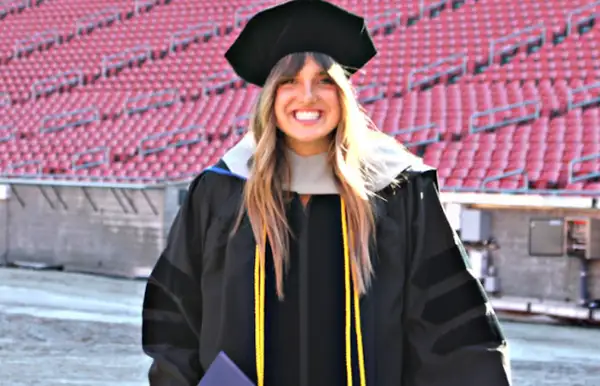International Students
Canadian Students
Our largest international population is Canadian students. Southern California provides a great opportunity to experience a different climate while developing new skills and friends. SCU has many Canadian graduates and faculty currently teaching on campus.
Financial Aid for Canadian Students & Scholarships
SCU is an approved international school that Canadian students can receive funding. Most of our Canadian students pay for their program through a mixture of federal and provincial aid, a line of credit, scholarships, and on-campus student employment. Types and amounts of aid vary by province and academic program. SCU’s Financial Aid Office can assist you in meeting your financial obligations and encourages you to meet with a financial aid counselor early in the admissions process to discuss your financing options. Talk with a financial counselor by calling (562) 947-8755 ext. 766.

Former Olympian and SCU LACC student, Tim Leon Schrijver, originally from Ontario, Canada, and his teammates on opening ceremonies night of the 2016 Rio Olympic Games. From left-to-right, Kai Langerfeld, Conlin McCabe, Tim Leon Schrijver, and Will Crothers.

SCU student Tim Leon Schrijver, originally from Ontario, Canada doing sculling (two-oar) training on Elk Lake, Victoria BC, at the Olympic national training center in Canada. Many kilometers rowed on that lake with the aim of perfecting his rowing turned to many hours of studies aiming to perfect his chiropractic expertise.

Blyss Saxon Gellert, DC, SCU Class of ’21 and 2021 recipient of the Alberta College and Association of Chiropractor’s Investing in our Future Scholarship. Dr. Gellert is originally from Montreal, Canada.

SCU student Tim Leon Schrijver, originally from Ontario, Canada, with his 2016 Team Canada Olympic rowing team.
Scholarships
SCU’s Canadian Scholarship is for F-1 Visa Canadian students who are enrolled in the Doctor of Chiropractic program and provides a maximum of a 20% discount on tuition. Students must be continuously enrolled full-time, maintain a minimum cumulative GPA of 2.5, remain in good academic and conduct standing, and adhere to all student rights and responsibilities as outlined in the University Catalog.
This scholarship is automatically provided to those who qualify with no application required and is subject to modification based on quarterly reviews by the university.
SCU offers additional scholarships and assistance to students with high academic standards and/or financial needs. Please review the scholarships and assistance opportunities at SCU Scholarships.
Federal/Provincial Aid
Students are eligible to apply for aid from Canada while attending SCU. Interested students will need to contact specific provinces to identify the appropriate application to qualify for federal and/or provincial financial aid.
Available Resource Links:
- Canadian Government Student Aid and Education Planning
- National Student Loans Service Center Canadian Government Student Loans and Grants
- Canada National Student Loans Service Centre YouTube Channel
Canadian students apply for student aid each year by completing an application online through the student financial assistance website of your home province or territory. Application forms should be submitted by March 1 of each year for priority processing. In addition, some Canadian students elect to access a student line of credit from a Canadian bank. Some lending institutions may offer loan funding specifically for your program of study.
Line of Credit
Students can work with the Canadian Imperial Bank of Commerce (CIBC), RBC Royal Bank, or other banks for a line of credit. A personal line of credit may help ease the financial burden. Vancouver CIBC advisors can work directly with students or refer business to another CIBC Banking Centre based on the student’s preferred location. Click here to search for a list of financial advisors by Province.
- Student Line of Credit (Royal Credit Line) – RBC Royal Bank. Tel.: 1-866-881-6618 (RBC Credit Specialist).
- Student Line of Credit | Lending | CIBC. Tel.: 1-866-525-8622.
- Student Line of Credit – ScotiaLine | Scotiabank Canada. Tel.: 1-800-472-6841
- Professional Student Line of Credit | BMO. Tel.: 1-877-225-5266
Immigration Regulations for Canadian Students
In terms of immigration regulations, the only difference between Canadians and other international students coming to the United States is that Canadian citizens do not require an application to a U.S. consulate or embassy for an entry visa.
Canadian students are still subject to the same regulations regarding employment in the United States, the requirement for full-time study, and all other provisions for maintaining F-1 visa status. It is especially important for Canadians to be vigilant about entering the United States in proper F-1 visa student status, as immigration inspectors are accustomed to admitting Canadian citizens as tourist visitors.
At the port of entry, Canadian students must present their passport, I-20 document, SEVIS fee receipt, and supporting financial documentation to the immigration inspector to be admitted into the U.S. in F-1 status.
You will be given an I-94 Admission/Departure card to complete. Be sure to look at your I-94 card before you leave the inspection area to ensure that it has the notation “F-1, D/S” written on it. Canadian students must have an I-94 card to confirm their current F-1 status. If not, you are in Visitor (B-2) status, a status that does not permit study in the U.S. If your Port of Entry is no longer issuing physical I-94 cards, you can verify your I-94 number and visa status through this attached link.
You must read about and abide by all provisions relating to F-1 status.
Student Visa/I-20 Documentation/F-1 Student Status/Paying the SEVIS fee
To qualify for an F-1 visa, students need to be accepted into an approved program at a Student and Exchange Visitor Program (SEVP) certified school and must meet U.S. Citizenship and Immigration Services (USCIS) guidelines to enter the United States under F-1 student status.
Students who have been offered acceptance into the Doctor of Chiropractic program will receive instructions from the SCU Office of Admissions on how to obtain an I-20. The form I-20 “Certificate of Eligibility for Nonimmigrant Student Status” is an official document provided by the SCU’s Primary Designated School Official (PDSO) and is required for all international students to apply for an F-1 student visa and to enter the United States.
Your I-20 will be issued to you after the campus DSOs receive and review your LACC Financial Visa form, a copy of your passport, evidence of sufficient financial support, and health insurance. These documents need to be completed and returned to SCU electronically via email, by express, or regular mail. Sufficient financial support is equivalent to the cost of one academic year at SCU which includes tuition, books, fees, housing, and miscellaneous costs. Refer to your specific program and the LACC Financial Visa form for cost details.
Proof of financial support may be demonstrated through a combination of any of the following:
- Original bank statement or a letter on bank letterhead.
- Original letter from a bank showing a line of credit.
- Original scholarship award letter.
- National government or provincial aid loan and grant award letters.
- Original bank account statement of a parent or sponsor. Students who show the Proof of Funding through a parent or sponsor must include a completed parent or sponsor form with notarization along with their I-20 application.
After the I-20 document is issued, all foreign students applying for F-1 status are required to pay a SEVIS fee of $350 USD This fee is paid directly to the U.S. government through this website link. Once the fee is paid, you will need to print your receipt as proof of payment is required before going to the U.S. consulate for a visa interview and is also required when crossing the border into the United States. Please note that Canadian citizens do not need to visit a consulate for an interview. Your F-1 visa status will be processed at the port of entry.
USCIS regulations allow F-1 students to enter the United States with an issued I-20 document and SEVIS payment receipt no earlier than 30 days before the program start date. You will find the Earliest Admission Date listed on your I-20.
All international students in valid F-1 student status are granted certain privileges and are subject to certain federal requirements and restrictions on activities. It is the student’s responsibility to understand these regulations and to maintain student status.
For more information, please visit the U.S. Department of Homeland Security Study in the States website.
Entry into the United States
- When entering and arriving in the U.S. for the first time, Doctor of Chiropractic students need to bring the following:
- Hardcopy of your signed I-20
- SEVIS fee payment receipt
- Proof of Canadian citizenship/passport
- Your original bank letter/supporting financial documents
- Your original letter of acceptance and any scholarships awarded
Nonimmigrant, non-US nationals should also be aware of vaccination requirements for all individuals entering the United States.
Once you enter the United States, you are required to meet with the SCU PDSO to complete your SEVIS registration.
Opening a Bank Account in the U.S.
U.S. financial institutions are required to verify the identity of every individual who opens a bank account. In compliance with federal regulations, all banks operating in the U.S. have established Customer Identification Programs (CIP) for anyone who seeks to open an account. The information that the banks must obtain from international students before opening an account are:
- Name
- Date of birth
- Street address – not P.O. Box
- An identification number. The identification number may be one or more of the following:
- Taxpayer identification number
- Passport number and country of issuance
- Alien identification card number
- Number and country of issuance of any other government-issued document evidencing nationality or residence and bearing a photograph or similar safeguard
It is important to remember that banks establish their own customer identification programs and may ask for additional documentation than what is described above.
Documents to bring to open an account:
- Unexpired passport
- I-94 card
- I-20
- Any secondary form of identification
- Letter from the SCU Designated School Official (DSO)
Your admissions advisor may provide you with a letter to the bank confirming your status at Southern California University of Health Sciences and asking for their assistance in opening your account.
Some Canadian banks offer US/Canada cross-border banking services. Check with your branch for availability.
Taxpayer Identification Numbers
Banks are required to report any earnings they receive on interest earned on your account. For this reason, bank representatives will ask for a taxpayer identification number, such as the Social Security Number (SSN) issued to those who work, or the Individual Taxpayer Identification Number (ITIN) issued by the Internal Revenue Service to those individuals who are not eligible for an SSN. Although the banks prefer that you already have one of these numbers, you can still open a bank account if you do not have one.
If students are eligible for a SSN, it is recommended to apply for one as soon as possible. Additionally, international students are eligible for a SSN if they have a work-related, nonimmigrant status such as H-1B, TN, R-1, J-1, or are an F-1 student approved for curricular practical training, optional practical training, or have secured on-campus employment. If students have applied for the SSN before opening a bank account, they should take a copy of the receipt notice. The receipt notice may serve as additional documentation that can help establish identity. As soon as a student receives an SSN, they should inform the bank.
If students are not eligible for a SSN, apply for an Individual Taxpayer Identification Number and once it is assigned, inform the bank of this number.
F-1 students who are not employed are not eligible for an SSN and must apply for an ITIN through the IRS instead.
ITIN application procedures require that students present evidence of ownership of an interest-bearing bank account. Students cannot obtain an ITIN until establishing a bank account.
After submitting the ITIN application, it will take the IRS approximately four to six weeks to assign a number. If the bank account does not pay any interest, then students must wait to file for the ITIN when filing the required tax forms in April. Visit the IRS website for more information.
Canadian Board and Licensure Exams
Canadian students usually take the Canadian and the U.S. board exams to become licensed in both countries, allowing practice in either country. Your choice will depend on where you see yourself practicing once you graduate, and beyond. As a Canadian student at SCU, you will have the option to take the U.S. board exam on campus during your time here.
Canadian Board Exams
SCU students consistently score high on the Canadian Board Exams. SCU offers Canadian chiropractic students board prep materials for students heading back to take the exam. There are three components to the exam. Canadian students are responsible for scheduling and traveling to take each exam (locations and dates are on the CCEB website).
Licensure in Canada
Chiropractic, like medicine and dentistry, is a self-regulating profession. Each U.S. state and Canadian province has unique requirements for licensure as well as scope-of-practice regulations and malpractice insurance requirements. An early understanding of these requirements will be invaluable to you as you prepare for your future career.
Licensure requirements include:
- Chiropractic program prerequisites
- Graduation from an accredited chiropractic institution
- Passing national and provincial board examinations
The SCU Doctor of Chiropractic program is designed to offer students education sufficient for licensure in all U.S. states, Canadian provinces and territories, and other foreign jurisdictions. Our graduates practice successfully across the country and internationally.
Additional resources regarding licensure and the chiropractic profession are available from the following:
- Federation of Chiropractic Licensing Boards
- Canadian Chiropractic Examining Board
- Canadian Chiropractic Association (links to Provincial Associations are accessible from here)
